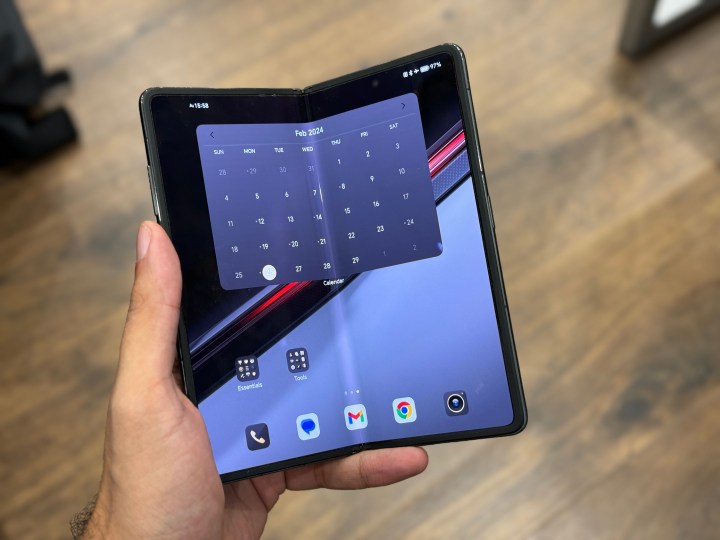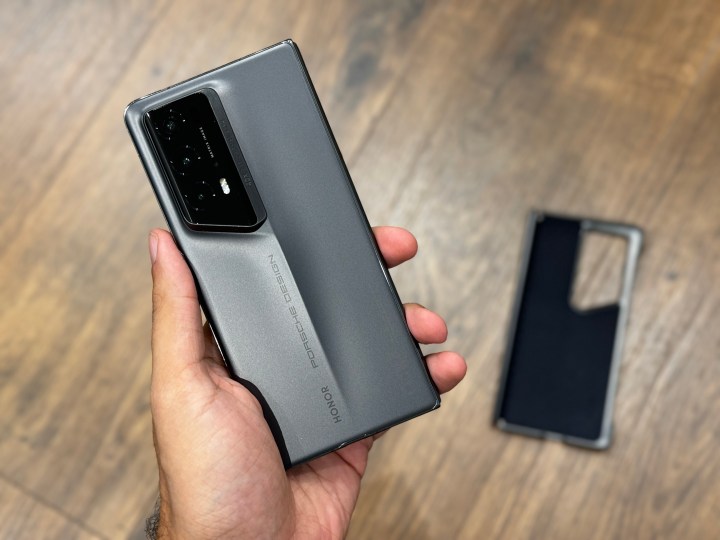
Last summer, the Honor Magic V2 surprised me with its thin and light design. It’s the closest a foldable phone has been to a slab phone. Now, at MWC 2024, Honor has one-upped itself with the Porsche Edition of the device.
The 2,699 euro Honor Magic V2 RSR might feature the same specifications, but it’s even lighter than the regular V2 – at 234 grams. I’ve had it for around three weeks now, and while I’ve enjoyed the experience of having a big screen folded in my pocket, a few things have bothered me.
A new benchmark for foldable phone design

At 234 grams, the Magic V2 RSR weighs just 2 grams more than the Samsung Galaxy S24 Ultra. For reference, the Galaxy Z Fold 5 and Pixel Fold weigh 253g and 283g, respectively. It’s also lighter than my current favorite foldable – the OnePlus Open (239g).
And it’s not just lightweight. The Magic V2 RSR is thin, too. At 9.9mm when folded, it’s close to a regular slab phone, so it’s more pocketable than the OnePlus, Samsung, and Google foldables. It’s easy to slide in my pocket, which helps the experience. For context, the Galaxy Z Fold 5, Google Pixel Fold, and the OnePlus Open are 13.46mm, 12.1mm, and 11.7mm thick, respectively. Meanwhile, the Galaxy S24 Ultra and Google Pixel 8 Pro measure 8.7mm and 8.8mm in thickness, respectively.
The thin and light design plays an important role when you have a foldable phone unfolded. After all, I’m typing, browsing, and getting work done on the go on the 7.92-inch display. If it’s heavy, it bothers me because I sometimes get through typing a whole article while commuting. It’s amazing how much work I can get done on a phone if it unfolds into a bigger screen. I can’t do it on the Galaxy Z Fold 5 or the Google Pixel Fold. The thin design allows me to carry it around in my pocket without feeling like I have two phones sandwiched in there, and that’s incredible.
The Magic V2 RSR’s Porsche-esque design stands out too. It looks classy for a phone with the flyline design on the back. It is made of titanium and is advertised to be reminiscent of the hood of a Porsche 911. Honor says it brings “sportscar feeling right into users’ palms,” which I’m not sure about because I’m not a sports car enthusiast. What I can say, however, is that it does give you a different grip than other phones, which I’ve grown to like. It’s a unique in-hand feel. This is where style meets function.

Honor also includes plenty of stuff in the box – in true expensive phone fashion. There’s a case with a leather feel to it with flexible protection for the hinge. It’s one of the nicest phone cases that I’ve ever used. You also get an Honor stylus, which works on the cover display and as well as the foldable screen. It’s big and can’t be carried with the phone, so you get a case for it that’s sleek and stylish – like one of those fancy pen covers. Furthermore, there are two fast chargers in the box. I’ve only been using one and haven’t felt the need to unbox the other one.
What I don’t like about this expensive phone

The one part that takes getting used to the design is the placement of volume buttons. When folded, they’re on the right edge, and when unfolded, they lie on the left edge. It’s always a bit confusing to me when I want to adjust the volume.
Apart from the hardware, you get a new wallpaper and themed icons. I don’t find it very appealing because it’s very minimal. You don’t really get a “Porsche” experience with the software. The notification panel is the same, the Settings menu remains basic like the regular Magic V2, and it still runs Android 13.
Honor has been slow with updating its past phones since it separated from Huawei. I wish the icons looked better, and I wish I could swipe down on the home screen to access the notification panel, but you can’t do any of that. It’s annoying because Magic OS requires you to swipe down from the top left corner to get to the notifications panel – making the basic day-to-day task a bit cumbersome.
I love multitasking on foldables, and the OnePlus Open has the best software for it, with Honor and Samsung in a close second. It doesn’t support typing on a Google Doc in multiwindow, but you can look at a PDF and jot down notes on Honor’s own documents app, which is not ideal. That said, you can get past this with pop-up windows, which are smooth and easy to use. I find Honor’s multitasking features pretty good.
Is it worth nearly $3,000?

The Honor Magic V2 sports a 6.43-inch cover display and a 7.92-inch foldable screen. The OLED panels support a dynamic 120Hz refresh rate. The displays are bright and vivid. As for the crease, it is less than the Galaxy Z Fold 5 but more visible than the OnePlus Open. I like watching movies and reading on it.
The cover display lies under the protection of a proprietary “NanoCrystal Shield.” It seems to work, because I’ve dropped my phone mistakenly a couple of times, and the display was fine. The Honor Magic V2 RSR is powered by the Qualcomm Snapdragon 8 Gen 2 chipset. It’s not the latest chipset from Qualcomm, but I haven’t had instances where I felt limited by it. You get 16GB of RAM and plenty of storage with 1TB. It’s also the first foldable phone to run Asphalt 9: Legends in 120 fps.
The Honor Magic V2 RSR packs a 5,000mAh silicon-carbon battery with 66W fast charging support. It gives me all-day battery life, which includes a lot of X (formerly Twitter), Instagram, WhatsApp, Slack, and Teams throughout the day — plus hours of browsing, clicking some photos, and about 20 minutes of navigation. The call quality has been clear, and I’ve had no problems hearing the people I’ve talked to.
The camera quality and specs also remain the same as the regular V2. There’s a 50-megapixel primary sensor, accompanied by a 50MP ultrawide-angle lens and a 20MP telephoto camera with 2.5x optical zoom and 50x digital zoom. Plus, you get two 16MP selfie shooters, both on the interior screen and the cover display. You can read more about the camera quality in my Magic V2 review here.
The Honor Magic V2 is priced at 1,999 euros in Europe without offers for the base model. By contrast, the Magic V2 RSR gets a 2,699 euro price tag for a more stylish design, more storage and RAM, and more in-box contents. Realistically, it’s not a great choice if you want a folding phone. Samsung, OnePlus, and Google all offer their own folding phones that cost significantly less than the Magic V2 RSR. It’s not a practical purchase by any stretch of the imagination, and you shouldn’t consider it a serious competitor to those other phones.
However, if you have around $3,000 to burn and you want a foldable that’s flashy, unnecessary, and as fancy as you can get, Honor now has an option just for you.




